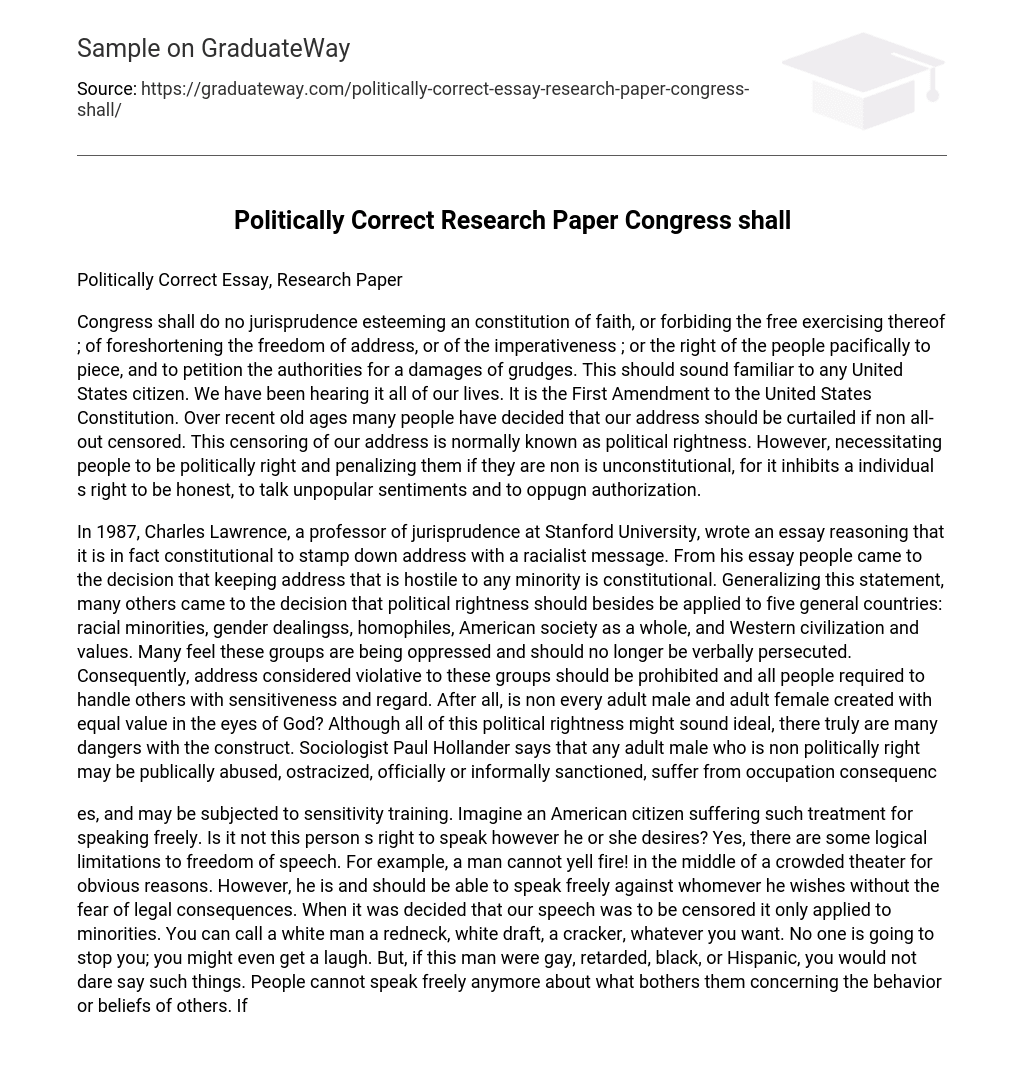Politically Correct Essay, Research Paper
Congress shall do no jurisprudence esteeming an constitution of faith, or forbiding the free exercising thereof ; of foreshortening the freedom of address, or of the imperativeness ; or the right of the people pacifically to piece, and to petition the authorities for a damages of grudges. This should sound familiar to any United States citizen. We have been hearing it all of our lives. It is the First Amendment to the United States Constitution. Over recent old ages many people have decided that our address should be curtailed if non all-out censored. This censoring of our address is normally known as political rightness. However, necessitating people to be politically right and penalizing them if they are non is unconstitutional, for it inhibits a individual s right to be honest, to talk unpopular sentiments and to oppugn authorization.
In 1987, Charles Lawrence, a professor of jurisprudence at Stanford University, wrote an essay reasoning that it is in fact constitutional to stamp down address with a racialist message. From his essay people came to the decision that keeping address that is hostile to any minority is constitutional. Generalizing this statement, many others came to the decision that political rightness should besides be applied to five general countries: racial minorities, gender dealingss, homophiles, American society as a whole, and Western civilization and values. Many feel these groups are being oppressed and should no longer be verbally persecuted. Consequently, address considered violative to these groups should be prohibited and all people required to handle others with sensitiveness and regard. After all, is non every adult male and adult female created with equal value in the eyes of God? Although all of this political rightness might sound ideal, there truly are many dangers with the construct. Sociologist Paul Hollander says that any adult male who is non politically right may be publically abused, ostracized, officially or informally sanctioned, suffer from occupation consequenc
es, and may be subjected to sensitivity training. Imagine an American citizen suffering such treatment for speaking freely. Is it not this person s right to speak however he or she desires? Yes, there are some logical limitations to freedom of speech. For example, a man cannot yell fire! in the middle of a crowded theater for obvious reasons. However, he is and should be able to speak freely against whomever he wishes without the fear of legal consequences. When it was decided that our speech was to be censored it only applied to minorities. You can call a white man a redneck, white draft, a cracker, whatever you want. No one is going to stop you; you might even get a laugh. But, if this man were gay, retarded, black, or Hispanic, you would not dare say such things. People cannot speak freely anymore about what bothers them concerning the behavior or beliefs of others. If one were to see a black man breaking the law, he or she might hesitate to tell the police. What if the policeman is black? He might assume that he or she is just racist and thinks that every black guy is a criminal. However, if the person is breaking the law, he is a criminal; his being black has nothing to do with it. What kind of nation do we live in where people have to hesitate to tell the truth as they see it? What is wrong with being honest? What is wrong is that our society has become so psychologically hypersensitive that it is against the law to say something that may hurt the feelings of various minorities. Political correctness strips people of their right to freedom of speech. No where in the Constitution did our forefathers write that United States citizen s have the freedom to speech, unless it hurts the poor, the gay community, or the feelings of a black person. People say stupid, hurtful things that anger others. This is their right as US citizens. If we begin censoring any speech we run the risk of suppressing the truth. After all, 250 years ago it was considered treason to speak out against the King of England.





